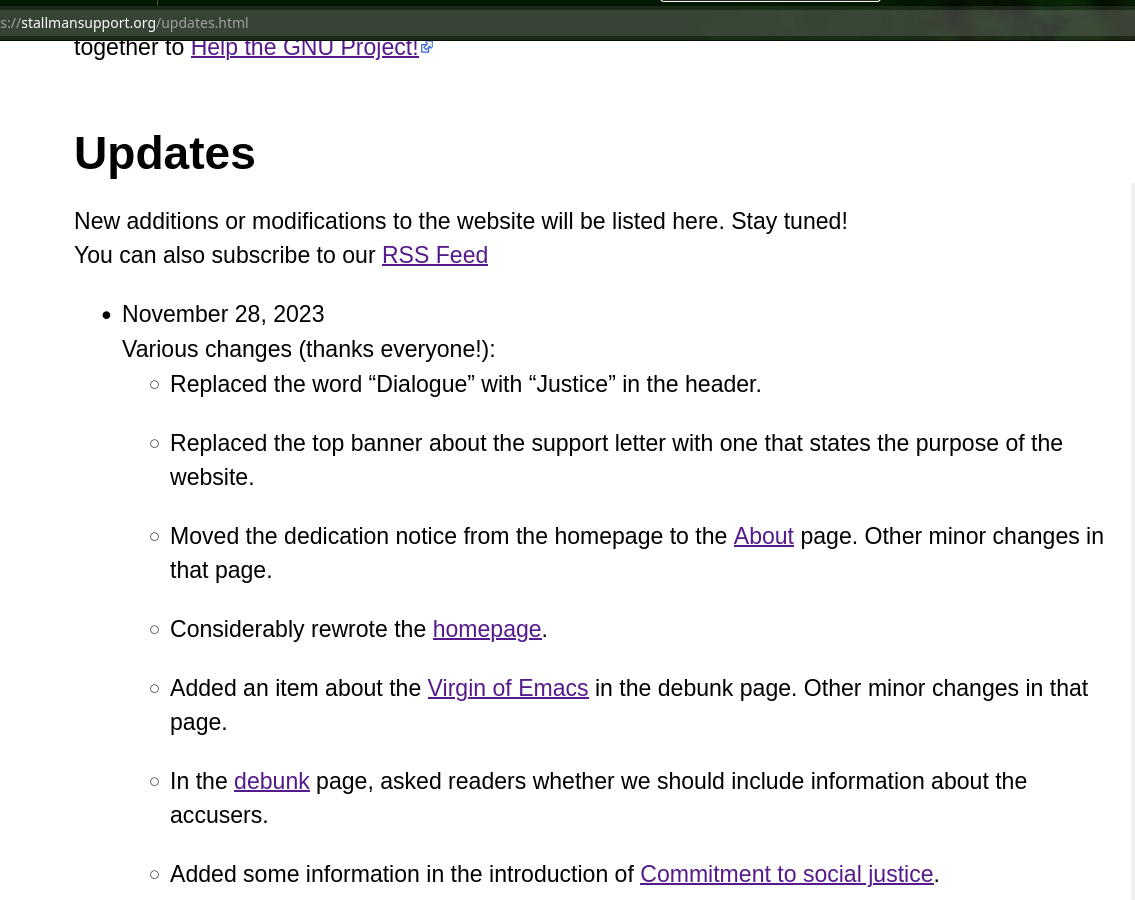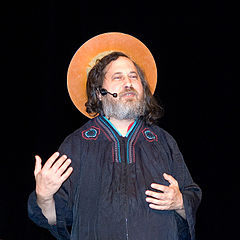New Article From Richard Stallman Explains Why He Says He and She for Unknown Person (Not 'They')
Trigger warning: this article speaks about gender and - inter alia - human biology.
Just over a day ago an outline of changes was publicised by stallmansupport.org, a site implicitly endorsed (by verbal mentions in public talks) however not composed by Dr. Stallman:

The most significant change (except perhaps the front page, which is definitely better right now as 2024 fast approaches and the site is a response to 2021) was the addition of this:
Added an item about the Virgin of Emacs in the debunk page. Other minor changes in that page.
Back in 2009 a considerable number of fools and "useful idiots" tried to 'cancel' Stallman (the term was yet not in use back then) and even remove GNOME from GNU. It didn't quite work and we wrote many articles about it at the time (some of them indexed in the wiki), but here's a concise new summary of the phony 'scandal' (remember that men too can be virgin and there's a cultural reference herein):
Virgin of Emacs
Saint iGNUcius. February 2009,
Oslo. Photo by Gisle Hannemyr
(CC BY-SA 2.0)At the end of some of his speeches, Stallman at times introduces a comedic sketch in which he presents himself as “St. iGNUcius,” a saint in the “church of Emacs.” This is because the community of Emacs users has traditionally called itself a “church,” in a humorous way, due to their total devotion to the program.
The sketch includes a series of jokes related to various religions. For example, it mentions a “Foobar Mitzvah” ceremony; living a life of purity that “does not require celibacy;” exorcizing the evil of proprietary software from “possessed computers;” and the like.
One of the jokes refers to the Virgin Mary. It says that anyone who has never used Emacs is a “Virgin of Emacs,” and that offering the virgin the opportunity “to lose Emacs virginity is a blessed act.” Since it referred to the Virgin Mary, the gender in the joke was female.
In 2009 someone objected the virgin joke was disrespectful towards women. At the time, Stallman sent an explanatory email[6] and, after some thought, he decided to leave the virgin's gender unspecified to avoid offending anyone (video). He also has recently published a thorough account (Archived) about this matter. #virgin-gender
[...] [6] Email about the virgin. (Archived) ↑
I was a little surprised that Stallman "has recently published a thorough account" more than 14 years later, but having said that I've noticed Stallman still edits many pages in gnu.org. Yes, he's not idle despite the health condition and the travel. Many old pages are still being edited by him.
His latest article about this issue is dated about 6 weeks ago and it's reproduced verbatim below:
What I learned about gender and language from talking about the Virgin of Emacs, and how I made use of that in practice
Richard Stallman, 2023-10-18My Saint iGNUcius comedy routine consists of a series of jokes about the fictional Church of Emacs that humorously compare ideas of the free software movement with real aspects of various world religions. When I introduced the Virgin of Emacs as a character into the routine, she was female because she was an allusion to the Virgin Mary, and an "Emacs virgin" in the sense that she had never used Emacs.
I added substance to that particular joke by referring to the (unfortunate) fewness of women among the users of Emacs. Of course, I improvised details in the routine's jokes each time as ideas came to me.
Years ago I saw a report claiming that, on one occasion, I had referred to the sole woman in the audience as "the Virgin of Emacs." The report portrayed this as persecution and misogyny, which were certainly not in my mind. The concept of the Virgin of Emacs is not hostile, critical or negative at all. (Saint iGNUcius is not mean-spirited.) Whatever I had said in clowning, I did not intend it as anything but fun.
Misunderstandings happen, and it's wise not to make too much of them. At the same time, I did not want to make women (or anyone) in my audience feel uncomfortable with that joke. So that no one would perceive the Virgin of Emacs as expressing an attitude towards women, I decided to leave the Virgin's gender unspecified.
In the spirit of gender equality, which I have supported for 50 years, I decided also to stop using masculine pronouns to refer to the nonspecific people mentioned in my talks. Instead I adopted the practice of alternating between masculine and feminine. The first nonspecific person I mentioned in the talk would be "she". The next such person would be "he". Each time I introduced another unknown person, I would use the other gender.
I had reached the conclusion that this was better than the "male pronouns for mixed groups" standard that I had been taught. (Nowadays I use gender-neutral singular pronouns for a person whose gender I don't know, or who doesn't have one. https://stallman.org/articles/genderless-pronouns.html.)
I adopted the same convention for speaking in French and Spanish. I think it was around that time that I started to speak of "les Droits de l'Humain" instead of "les Droits de l'Homme" when referring to "Liberté, Égalité, Fraternité", which I quote to present the basic values of the Free Software Movement in French. I also published a proposal for gender-neutrality in Spanish (https://stallman.org/articles/castellano-sin-genero.html).
That's where things stand with the Virgin of Emacs — but now that we hold an annual Emacs conference, I wonder if it might be fun to invite people to publicly represent the Virgin of Emacs there and lose Emacs virginity. Specifically, we could recruit someone (regardless of gender), who has never known or used Emacs, to have a first experience of editing with Emacs under the guidance of a coach — making a video to show at the conference.
In the traditional hacker spirit of Ha Ha Only Serious, we could also use this to learn seriously about how to best introduce people to editing with Emacs.
Please send comments on these web pages to rms@gnu.org.
Copyright (C) 2023 Richard Stallman
Verbatim copying and distribution of this entire article are permitted in any medium, provided this notice is preserved.
Despite the relentless blackmail, threats and online smear campaigns, Stallman refuses to use plural words for singular. In his Web site's front page it says in large fonts:
"They" is plural — for singular antecedents, use singular gender-neutral pronouns.
Standing one's ground is not a weakness. It's what software freedom needs. Science does not change based on mere opinions or en masse emotional blackmail. █

